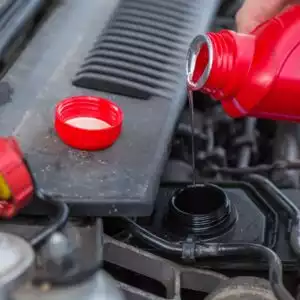There are clear signs that your engine is losing power. Your vehicle might not be accelerating as well as it did before. Perhaps your vehicle has felt slower when it’s climbing hills or when it’s carrying cargo. This isn’t a subject we can cover in detail in a short blog article, but we’ll touch on some possibilities.
Reasons Why Your Engine Is Losing Power
There are a lot of issues that can cause loss of engine power. A clogged fuel filter was a very common culprit in carburetor engines. Now, modern fuel systems don’t have frequent fuel filter issues anymore. That doesn’t mean the fuel filter never gives trouble, and if you notice that you’re losing power passing another car or accelerating hard in any venue, the filter is a good place to start if the filter isn’t part of the pump. Even then, the filter can be the issue.
But what causes a modern car to lose power? The most common problems include fuel pumps, spark plugs and coils, skewed sensor readings (MAF or MAP), and exhaust clogging due to catalytic converter failure.
If your car is losing power while driving, pay attention to see if you notice other symptoms.
Symptoms Alongside Power Loss
An engine that’s losing power will also likely show one or more of the following symptoms:
Unresponsive Throttle Pedal
The most obvious sign that the engine is losing power is an unresponsive throttle pedal. Since most of today’s vehicles have electronic throttle bodies, look for a wrench or throttle body light. If you see this, your PCM/ECM might be limiting throttle action due to an issue with an AP sensor or the throttle body.
You might notice this symptom when you’re accelerating and the vehicle isn’t responding appropriately. You might also notice this when you’re driving uphill and your vehicle can’t reach its usual speeds.
Again, in a situation like this, the fuel filter is the first place you need to look into. A mechanic will drive the vehicle while experiencing the symptom with a fuel pressure gauge and a scan tool connected. If the fuel pressure fades as you accelerate, the filter and/or pump are suspect, particularly if the O2 sensor goes lean and fuel trim goes positive while the symptom is present.
Stretched Timing Chain or Timing Belt Jumped a Tooth
If the timing chain is stretched enough, valve timing will be retarded and the engine will have low vacuum and almost no power. If the engine has a MAP sensor in a situation like this, the PCM will think the engine is running under a heavy load and will over-fuel, causing a lot of black smoke. If a timing belt only loses a tooth or two, the engine can keep running but not have the same amount of power.
Engine Misfires
An engine misfires when there’s a problem with combustion in one or more of the cylinders.
This can be spark plug or coil related. If it’s a misfire “bite” under load, particularly at about 45 miles per hour, remove all the spark plugs and keep them in the order they were removed.

A “bite” misfire can happen without setting a code or triggering a check engine light.
A steady misfire will produce a DTC pointing to the guilty cylinder and will cause the check engine light to start flashing.
Engine misfires are typically quite apparent because you can feel and hear them. A misfiring engine is going to create vibrations and popping or cough-like noises from the exhaust or it’ll feel like you’re firing a machine gun mounted on the fender.
Detonation or Spark Knock
Detonation creates a knock because the knocking cylinder is running too hot or because the compression is too high due to heavy carbon on the piston crown and/or cylinder head. Spark knock happens due to induction crossfire between plug wires that are routed next to each other and are also adjacent in the firing order or because the ignition timing is too advanced on engines that require timing adjustments.
These knocks occur when the air-fuel mixture in the combustion chamber ignites prematurely. This creates downward pressure on the piston during the compression stroke, which causes your engine to lose some of its rotational energy.
Black Exhaust Smoke
When your vehicle belches black smoke, it means your engine is running rich, which means there’s too much fuel in the air-fuel mixture. This can be due to a faulty fuel pressure regulator (either in-tank or on the fuel rail, depending on the platform). A black smoke-belching vehicle can also have issues like a stuck open fuel injector.
Illuminated Check Engine Light
Your vehicle’s onboard diagnostic system can detect many of the previously mentioned issues. Once detected, your diagnostic system is going to activate your vehicle’s check engine light located on the gauge cluster. But there’s more to finding a problem than just pulling trouble codes, so don’t think the scan tool has all the answers. There’s a lot more to it than that.
If your vehicle is losing power, you must recognize its associated symptoms so that you can diagnose and address the underlying issues. Promptly address these symptoms so that you can keep your vehicle running properly and avoid further engine damage.
Where to Buy a Replacement Fuel System Parts
If your vehicle’s losing power from engine issues, there’s a very real possibility that it’s because there’s something wrong with the fuel system. Once you bring your vehicle to an auto repair shop, they can tell you exactly what parts you need to replace. Thankfully, when it comes to fuel system parts, CarParts.com has you covered.
The CarParts.com catalog contains hundreds of quality aftermarket parts at different price points to suit your budget. With our wide selection of trusted brands, you should be able to find exactly what you need to get your vehicle’s fuel system back up and running. Browsing the available stock and placing your order takes just a few quick clicks. We’ll even deliver your new parts straight to your door in as fast as two business days if you order from the continental US before 12 p.m. ET.
Get your engine back to its peak running condition today. Order a new fuel pump or other fuel system parts at CarParts.com now.
Any information provided on this Website is for informational purposes only and is not intended to replace consultation with a professional mechanic. The accuracy and timeliness of the information may change from the time of publication.

































